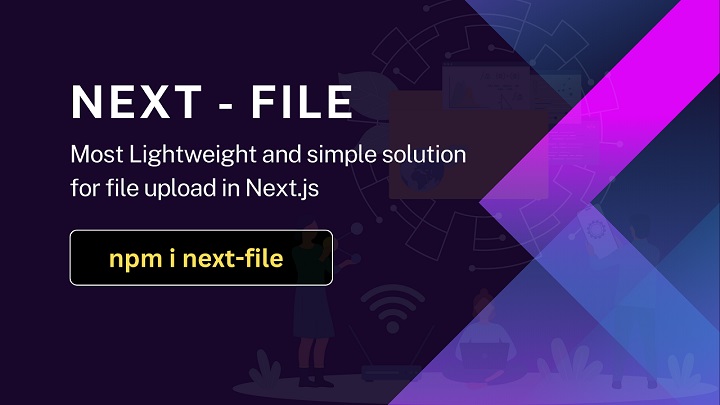Next-File is a lightweight npm package tailored for file management within Next.js applications. It simplifies the process of uploading files to your Next.js server and provides an easy-to-use interface for deleting files when they are no longer needed. With seamless integration into Next.js projects, this package offers robust functionality to handle file uploads and deletions efficiently, enhancing the development experience for Next.js developers.
npm i next-fileyarn add next-file- File Upload: Easily upload files to your Next.js server with minimal configuration.
- File Deletion: Delete files from your server effortlessly when they are no longer required.
- Supported Formats: Supports a wide range of file formats including images, documents, and more.
- Error Handling: Provides comprehensive error handling to ensure smooth file management operations.
- Lightweight: Designed to be lightweight and unobtrusive, minimizing overhead and optimizing performance.
- Next.js Integration: Seamlessly integrates into Next.js projects, maintaining compatibility with the Next.js ecosystem.
export async function POST(req,res) {
try{
let result=await Upload(req,"files",['jpg','png','pdf'])
return NextResponse.json({status:"success",data:result})
}
catch (e) {
return NextResponse.json({status:"fail",data:e})
}
}export async function DELETE(req,res) {
try{
const filePath = './public/files/1709098593107_demo.png';
let result=await deleteFile(filePath)
return NextResponse.json({status:"success",data:result})
}
catch (e) {
return NextResponse.json({status:"fail",data:e})
}
}import React, { useState } from 'react';
import axios from 'axios';
const FileUploadForm = () => {
const [selectedFile, setSelectedFile] = useState(null);
const handleFileChange = (event) => {
setSelectedFile(event.target.files[0]);
};
const handleSubmit = async (event) => {
event.preventDefault();
if (!selectedFile) {
alert('Please select a file');
return;
}
try {
const formData = new FormData();
formData.append('file', selectedFile);
const response = await axios.post('http://localhost:3000/api/upload', formData, {
headers: {
'Content-Type': 'multipart/form-data'
}
});
console.log('File uploaded successfully:', response.data);
} catch (error) {
console.error('Error uploading file:', error);
}
};
return (
<div>
<h2>File Upload</h2>
<form onSubmit={handleSubmit}>
<input type="file" onChange={handleFileChange} />
<button type="submit">Upload</button>
</form>
</div>
);
};
export default FileUploadForm;import React, { useState } from 'react';
const FileUploadForm = () => {
const [selectedFile, setSelectedFile] = useState(null);
const handleFileChange = (event) => {
setSelectedFile(event.target.files[0]);
};
const handleSubmit = async (event) => {
event.preventDefault();
if (!selectedFile) {
alert('Please select a file');
return;
}
try {
const formData = new FormData();
formData.append('file', selectedFile);
const response = await fetch('http://localhost:3000/api/upload', {
method: 'POST',
body: formData
});
if (!response.ok) {
throw new Error(`HTTP error! status: ${response.status}`);
}
const data = await response.json();
console.log('File uploaded successfully:', data);
} catch (error) {
console.error('Error uploading file:', error);
}
};
return (
<div>
<h2>File Upload</h2>
<form onSubmit={handleSubmit}>
<input type="file" onChange={handleFileChange} />
<button type="submit">Upload</button>
</form>
</div>
);
};
export default FileUploadForm;MIT License
Copyright (c) [2024] [RABBIL HASAN]
Permission is hereby granted, free of charge, to any person obtaining a copy of this software and associated documentation files (the "Software"), to deal in the Software without restriction, including without limitation the rights to use, copy, modify, merge, publish, distribute, sublicense, and/or sell copies of the Software, and to permit persons to whom the Software is furnished to do so, subject to the following conditions:
The above copyright notice and this permission notice shall be included in all copies or substantial portions of the Software.
THE SOFTWARE IS PROVIDED "AS IS", WITHOUT WARRANTY OF ANY KIND, EXPRESS OR IMPLIED, INCLUDING BUT NOT LIMITED TO THE WARRANTIES OF MERCHANTABILITY, FITNESS FOR A PARTICULAR PURPOSE AND NONINFRINGEMENT. IN NO EVENT SHALL THE AUTHORS OR COPYRIGHT HOLDERS BE LIABLE FOR ANY CLAIM, DAMAGES OR OTHER LIABILITY, WHETHER IN AN ACTION OF CONTRACT, TORT OR OTHERWISE, ARISING FROM, OUT OF OR IN CONNECTION WITH THE SOFTWARE OR THE USE OR OTHER DEALINGS IN THE SOFTWARE.
